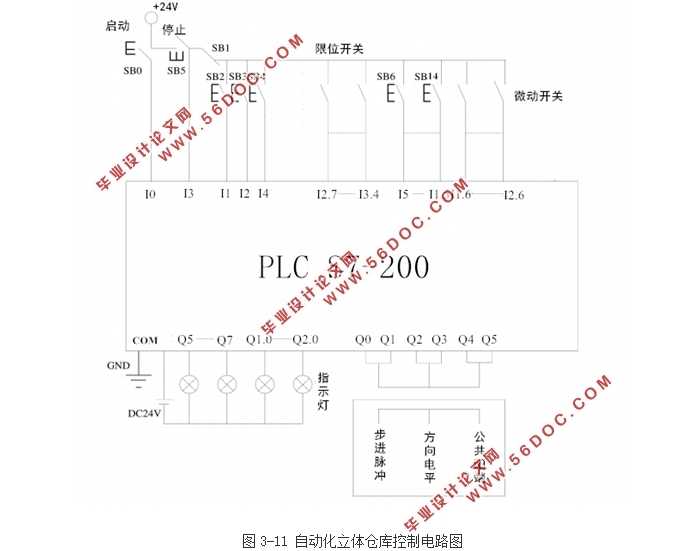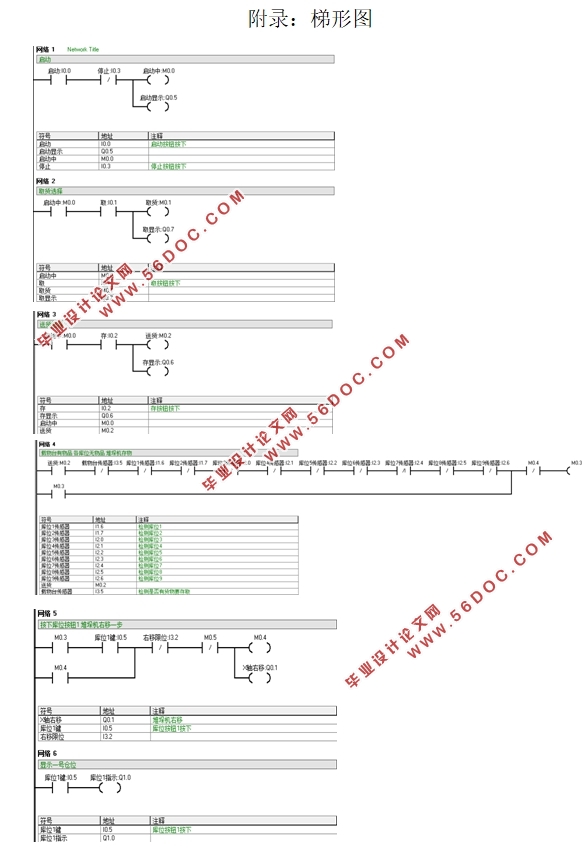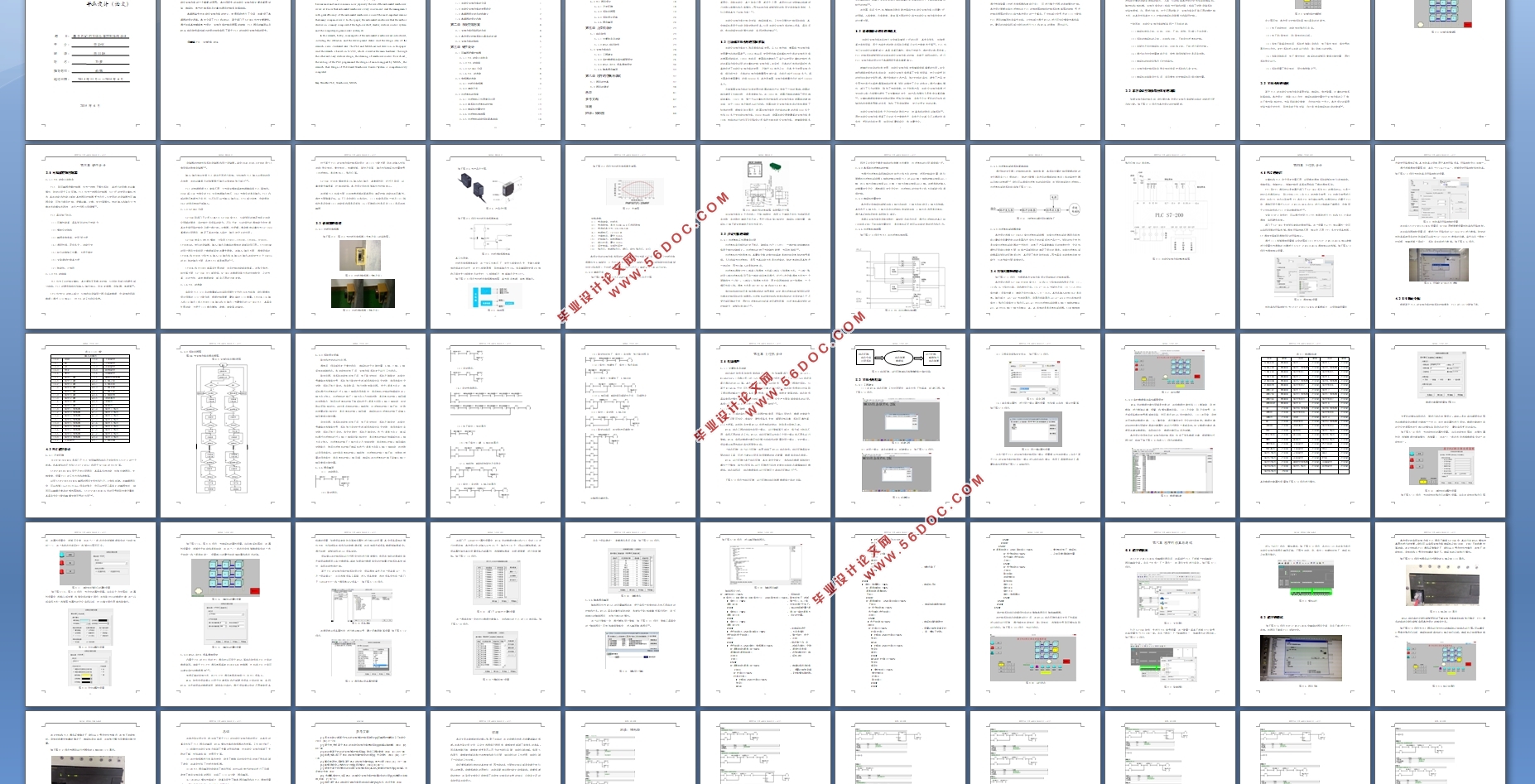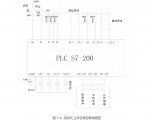基于PLC的立体仓库控制系统设计(任务书,开题报告,外文翻译,论文说明书14000字)
摘 要
当前立体仓库在国民经济发展中的应用已经非常普遍,尤其是自动化立体仓库。自动化立体仓库具有很好的便利性,高效率的管理成为了很多企业选用自动化立体仓库的一个重要的原因。本文所研究的自动化立体仓库主要由高层货架,堆垛机,电气控制系统及计算机程序控制系统等组成。
本课题首先对自动化立体仓库的定义、发展现状进行了介绍,并阐明了本课题的设计思路。本文介绍了PLC和MCGS,基于西门子S7-200作为主要硬件。通过完成其他辅助电气设计,立体仓库控制流程图的绘制,PLC程序的编写以及MCGS组态软件监视部分的设计综合实现了基于PLC的自动化立体仓库的研究。
关键词:PLC 立体仓库 MCGS
Design of PLC-based Warehouse Control System
Abstract
With the development of national economy , the application of the warehouse has become more and more common now ,especially the use of the automated warehouse. As we all know that automated warehouse is very convenient. And the management with great efficiency of the automated warehouse is one of the most important reasons that many companies use it. In this paper, the automated warehouse that the author studies on is mainly composed of the high-rise shelf, stacker, electrical control system and the computer program control system, etc.
In this research, firstly, some aspects of the automated warehouse are introduced, including the definition and the development status. And the design idea of the research is also illustrated later. The PLC and MCGS are laid stress on in this paper. And the research is based on S7-200 , which is used as the main hardware. Through the other auxiliary electrical design, the drawing of warehouse control flow chart , the writing of the PLC program and the design of monitoring part by MCGS , the research that Design of PLC-based Warehouse Control System is comprehensively completed.
Key Words: PLC; Warehouse; MCGS



目 录
摘 要 I
ABSTRACT II
第一章 引言 1
1.1 自动化立体仓库的介绍 1
1.2 自动化立体仓库的发展状况 1
1.3 本课题设计的目的和意义 2
1.4 本课题的设计内容 3
第二章 系统控制方案 4
2.1 立体仓库所实现的目标 4
2.2 本次设计控制系统应具有的功能 4
2.3 立体仓库的结构 5
第三章 硬件设计 7
3.1 可编程逻辑控制器 7
3.1.1 PLC的含义与特点 7
3.1.2 PLC的组成 7
3.1.3 S7-200介绍 8
3.1.4 PLC 的选型 8
3.2 传感器的选型 9
3.2.1 对射式传感器 9
3.2.2 微动开关 11
3.3 步进电机的选型 12
3.3.1 步进电机工作原理及应用 12
3.3.2 本系统步进电机的控制 13
3.3.3 堆垛机位置定位 13
3.3.4 步进电机接线图 13
3.3.5 步进电机驱动系统基本组成 14
3.3.6 步进电机驱动器选型 14
3.4 控制电路图的设计 14
第四章 下位机设计 16
4.1 PLC的通信 16
4.2 I/O地址分配 17
4.3 PLC程序设计 18
4.3.1 开发环境 18
4.3.2 系统流程图 19
4.3.3 系统设计思路 20
4.3.4 程序编写 20
第五章 上位机设计 23
5.1 组态软件 23
5.1.1主要特点及功能 23
5.1.2 MCGS组态软件 23
5.2 立体仓库组态 24
5.2.1 工程建立 24
5.2.2 实时数据库与监视画面设定 26
5.2.3 MCGS与PLC设备通信设定 30
5.2.4 脚本程序编写 33
第六章 程序的仿真与调试 37
6.1 程序的仿真 37
6.2 程序的调试 38
总结 41
参考文献 42
致谢 43
附录:梯形图 44
|







